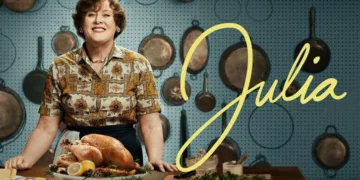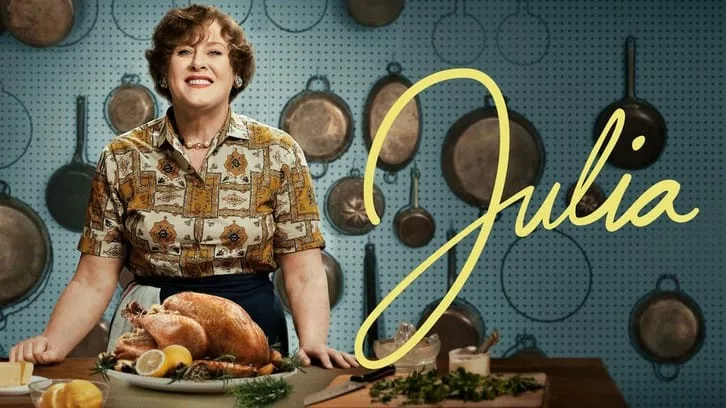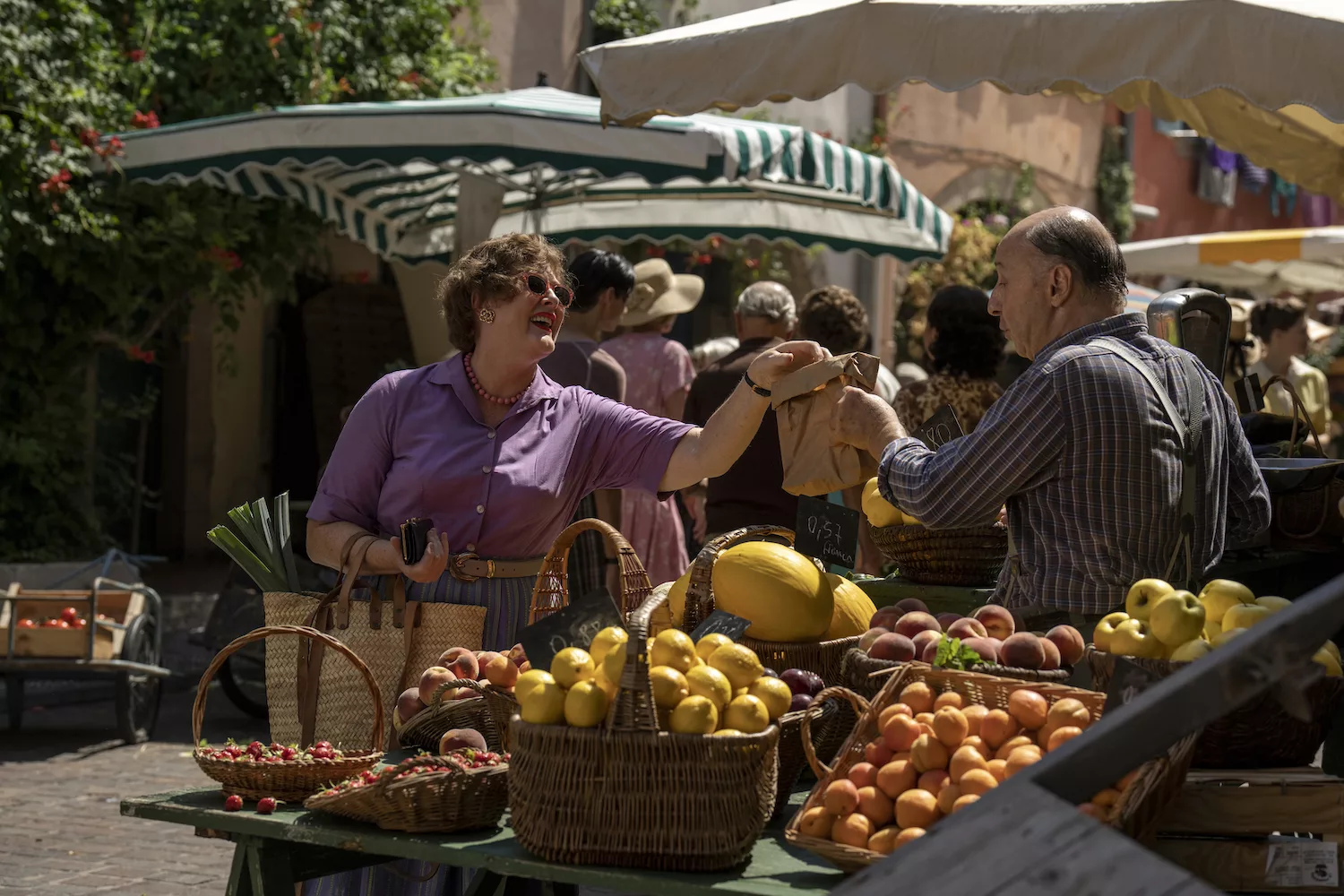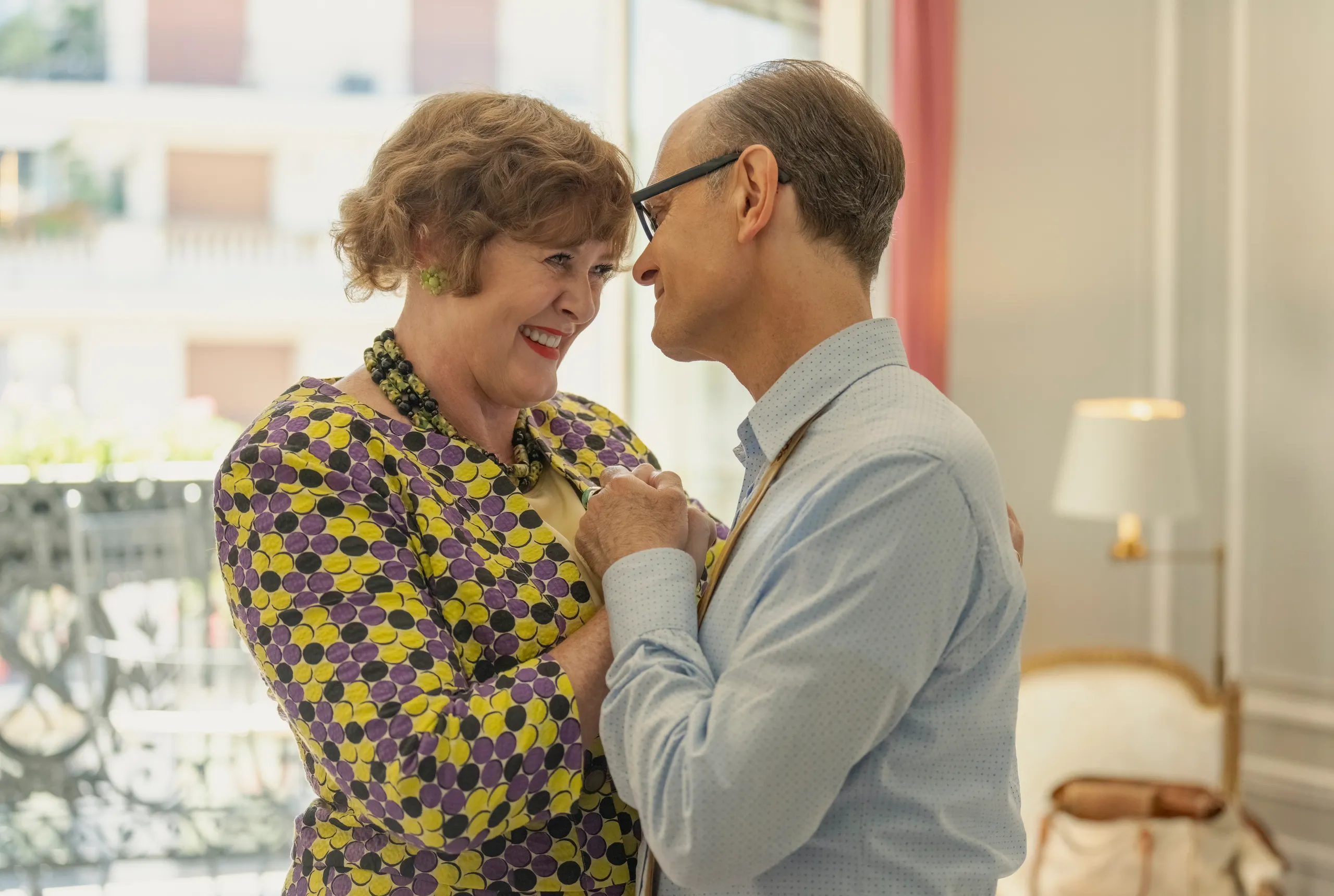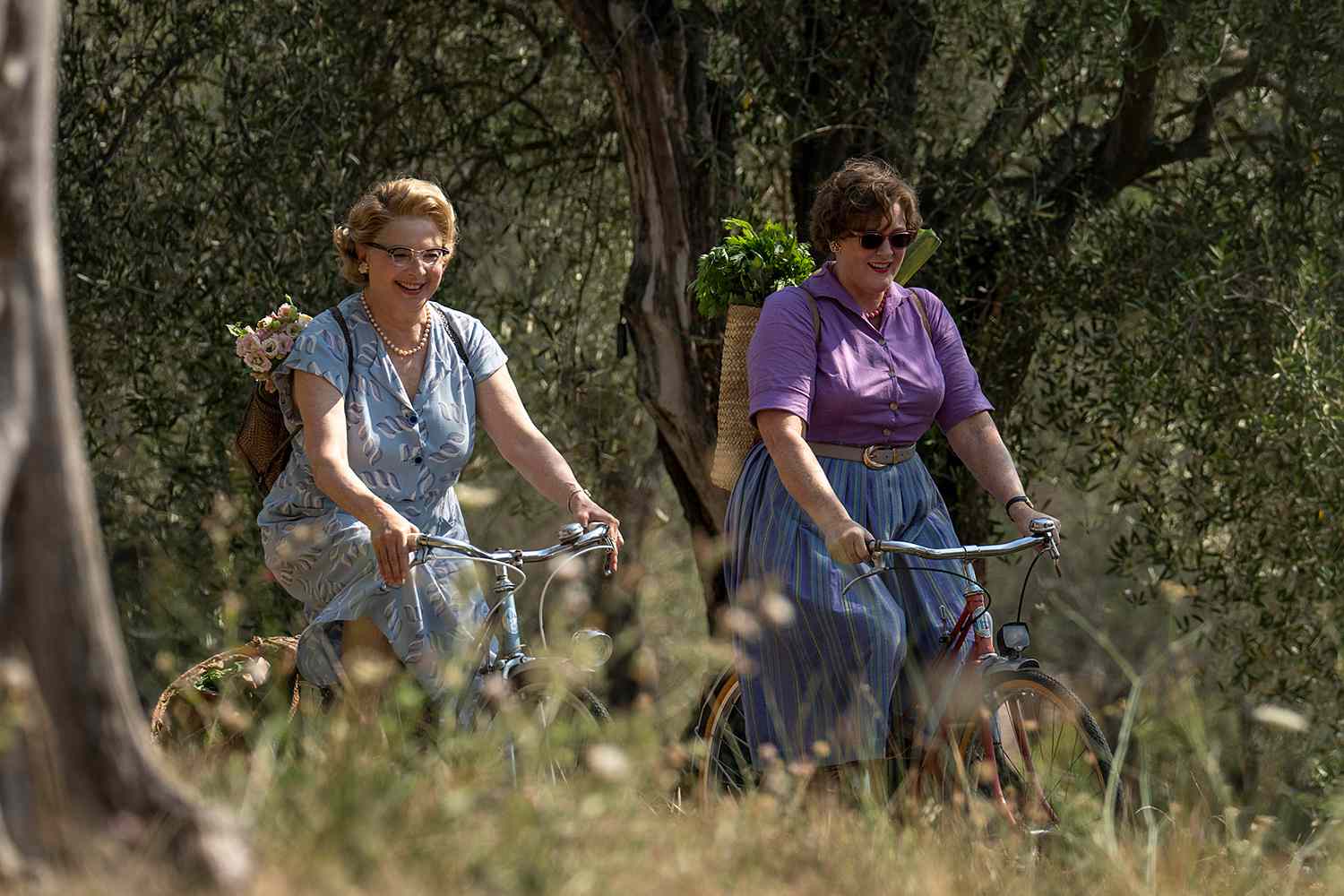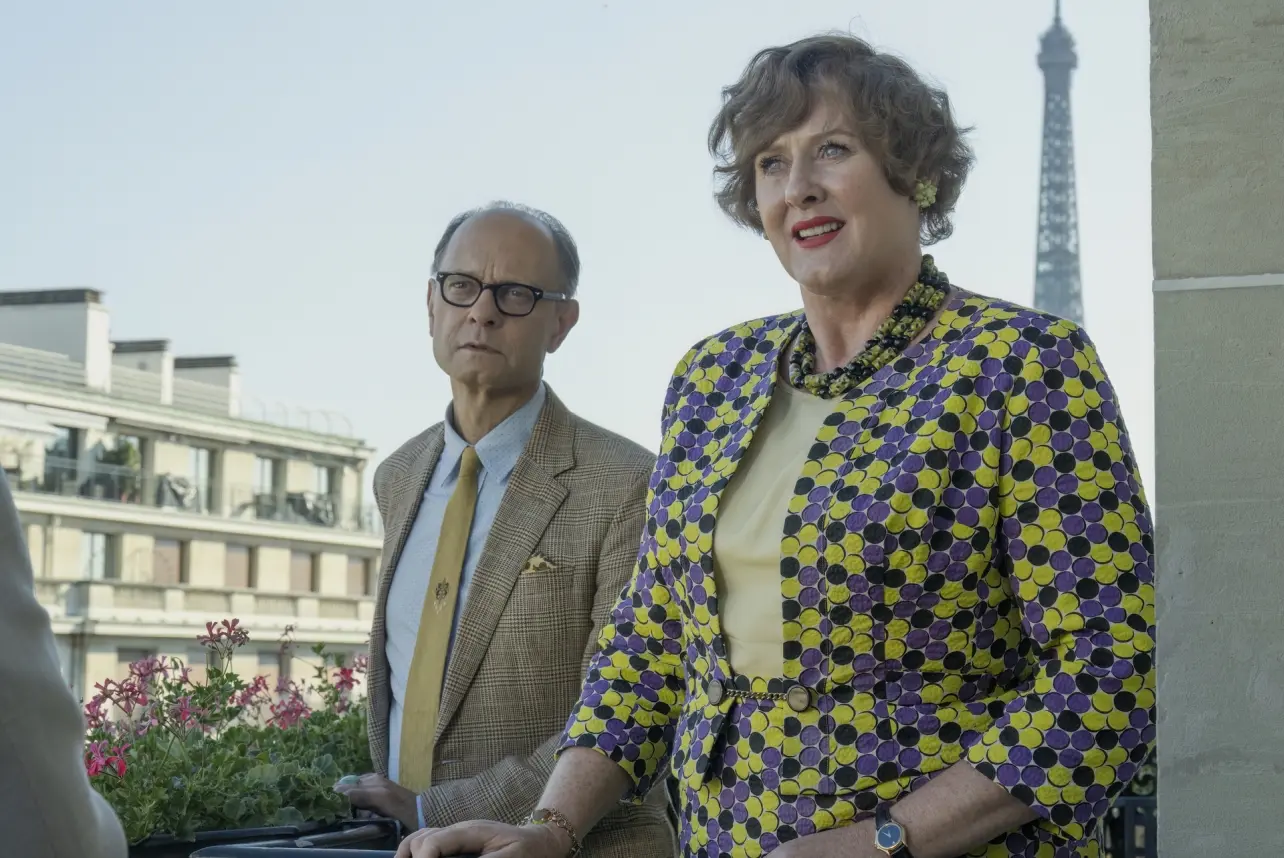Who doesn’t love Julia Child? With her warbly voice, towering height, and contagious passion for French cuisine, the celebrity chef won over America’s hearts and kitchens in the 1960s. Her cooking show The French Chef revolutionized our relationship with food, proving that complex dishes like coq au vin and soufflés weren’t just for fancy restaurants. They could be whipped up at home with the right guidance from everyone’s favorite “high priestess of butter and cream.”
The first season of Julia brought Child’s unlikely rise to fame to life in an utterly charming fashion. With British acting dynamo Sarah Lancashire perfectly embodying Julia’s eccentric charm and David Hyde Pierce providing delightful support as her devoted husband Paul, we watched the genesis of an icon. Critical and audience acclaim quickly followed.
As we rejoin Julia in season 2, she’s now a bona fide household name after the smash success of The French Chef’s first run. But with fame comes pressure to recreate that magic. This time, Julia takes her show on the road, cooking up masterpieces everywhere from the French Riviera to the White House kitchen. Yet more challenges await as ambitious new collaborators enter the mix, political probes threaten her quiet Cambridge life, and Julia realizes celebrity comes with strings attached. Through it all, her irrepressible joie de vivre perseveres. But can her marriage and friendships withstand the heat? Tune in to find out!
The Winning Recipe: Julia’s Standout Ensemble Returns
At the heart of Julia’s appeal lies Sarah Lancashire’s masterful performance as the iconic chef. With her gangly physicality, warbly voice, and innate warmth, Lancashire makes Julia feel endearingly human rather than a caricature. We see past the pop culture legend to the flesh-and-blood woman, passionate and prickly. This season tests Julia’s ego as her celebrity balloons, forcing her to confront ambition’s dark side when a talented young director threatens her spotlight. Yet Lancashire keeps us firmly on Julia’s side. However famous she grows, we still relate to the insecure artist within, just hoping her soufflé won’t fall.
Of course, Julia would be lost in the kitchen without her soulmate Paul Child keeping the home fires burning. As played withNeurotic wit and wisdom by David Hyde Pierce, Paul continues to ground his wife even as her star shoots into the stratosphere. Their palpable chemistry and romantic spontaneity remain a huge draw this season, whether they’re sneaking off on a Parisian romantic getaway or simply cuddling on the couch. Beyond the bedroom antics, Paul’s unwavering support allows Julia to take risks, reassuring us “never cut, never start over” when culinary disasters strike.
The cozy couple gets plenty of backup from WGBH’s merry band of misfits, especially producer Alice Naman. One of the show’s few prominent female characters, Brittany Bradford imbues the fictional Alice with ambition and agency as she fights workplace sexism. We feel her keen frustration as her ideas get ignored by the men upstairs. “You have a spotlight – no, most of us can’t do anything about it. But you can!” she reminds Julia about leveraging fame for women’s rights. The tensions between utilizing celebrity for personal gain versus social change leave intriguing ethical questions in Julia’s sizzling wake.
“Savor the journey of self-discovery and culinary passion in our A Taste of Love review. This Hallmark rom-com serves up a delicious blend of romance, family drama, and mouthwatering food, perfect for viewers looking for a comforting and heartwarming story. While it may not offer groundbreaking storytelling, its familiar flavors are sure to please fans of the genre.”
Bonjour France! Julia Cooks Up Fresh Stories
Julia spreads its wings this season, trading Boston’s WGBH studios for far-flung locations like the dazzling French Riviera. Opening the premiere episode seaside provides visual eye candy through lush cinematography and transportive period details. Meandering hillside bike rides with Simca, Paul painting fields of purple lavender, leisurely picnics overflowing with crusty breads – the sensory aesthetics prove utterly seductive. An extended guest appearance from culinary luminary James Beard and his boozy fried chicken only amplifies the food porn potential. Yet while the atmosphere delights, easygoing moments with Julia traipsing European farmers markets sacrifice meaningful conflict. The season takes awhile finding its narrative momentum amid these scenic seasonal ingredients.
Back on set, director Russ Morash’s departure makes room for an exciting new creative voice – Rachel Bloom’s Elaine Levitch. A veteran helmer with artistic ambitions matching Julia’s own, Elaine seems positioned as an eventual successor for middle-aged Julia. The trickiness comes in asserting herself on a show bearing another woman’s name, leading to sly behind-the-scenes power plays with Sarah Lancashire’s insecure celebrity. Their tensions – heightened by Elaine and Alice’s female-focused passion project For Women, By Women – introduce thought-provoking wrinkles about feminism’s limitations in a man’s industry. Can stellar talents mentor future generations when cultural sexism turns sisterhood into cutthroat competition? Julia leaves the answer deliciously open-ended.
Beyond broadcasting boob tube drama, Julia’s ballooning fame grants insider peeks at navigating celebrity’s blessings and curses. FBI probes into her left-leaning history complement fawning magazine profiles, highlighting the Madame Curie-level microscope scrutiny. Julia plays it coy, leveraging her public platform while mining humor from the circus. “They expect me to have an opinion on civil rights and voting reform?” she balks in that trademark New England drawl. But soon she’s holding court from the White House kitchen itself. However reluctant a role model Julia feels, her cultural currency proves undeniable. And a bubbly visit from counter-culture queen Avis DeVoto (Bebe Neuwirth) involving acid-laced coffee reminds not to underestimate the era’s shifting tides.
A Movable Feast: Soaking Up Julia’s Sensory Delights
At its core, Julia remains delightful comfort food TV thanks to Lancashire’s talent tackling a pop culture giant. Rather than an extended SNL sketch, she makes Julia Child an eccentric yet everyday saint – scattered, insecure, horny, and wholly human. We chuckle equally at her tirades over subparsole meunière and her frisky flirtations. That balance of silliness and soul generates goodwill, so we indulge the mouthwatering diversions into oysters Rockefeller and loin of lamb forestière glory. This cozy escapism holds particular appeal amid current real-world turmoil, offering experiential escapism through exquisite aesthetics transporting us back to the stylish 1960s.
Beyond the delectable cinematography, a standout ensemble cooks up engaging entertainment. Lancashire and Pierce continue carrying the dramatic weight, but Fibonacci, Bebe Neuwirth, and the WGBH crew create a communal meal rather than a series of side dishes. There’s genuine care evident in how Alice, Avis, and Judith get their own minor arcs instead of merely being Julia’s props. We invest because they come across as real people – fully embodied by actors having fun with the era’s events. Even when stories stall, the characters retain our interest and goodwill through sheer performance charm. It takes serious chops to skirt potential caricature, heightened by the nostalgic setting. But the cast feels at home, using relatable humor and heart to sell the period piece.
At its best, Julia gets at essential truths other biographical takes often miss – chiefly Child’s sexuality and ego. The real woman clearly adored her husband along with life’s sensual pleasures, captured vividly on screen minus stodgy filters. And Lancashire allows glimpses of melancholy and insecurity behind the TV persona’s patent cheer. Who wouldn’t feel threatened by a hip young upstart threatening to dethrone them? Or feel ambivalent leveraging their celebrity platform? The insights aren’t particularly deep, but they add resonance to a woman relegated as kitschy nostalgia. Dabbing a sheen of humanity over the pop culture veneer makes Julia Child more interesting to modern viewers. We get the legacy along with subtle commentary on fame’s Faustian bargains.
Missing Some Spice: Room to Grow Despite Delights
For all its sensory pleasures, Season 2 struggles balancing the riches both in characters and storylines. Julia remains the main attraction, but the expanded ensemble and locales often relegate our star player to the sidelines. Late-arriving director Elaine Levitch presents a particularly odd structural choice, only introduced halfway through the season and lacking setup until she suddenly comes into conflict with Julia. The result feels contrived, denying richness to the fictional Alice while shortchanging the credentials of a talented performer in Rachel Bloom. Elaine quickly grows into an intriguing foil, ambitious and progressive. Yet we can’t help wonder what depths further mining her background rather than the rushed rivalry might have brought.
Indeed, the season too often uses supporting characters for flavor or comic relief rather than fully realizing their inner lives. Bebe Neuwirth’s delightful Avis feels like she’s on permanent holiday from The Marvelous Mrs. Maisel, all quirky shrugs and malapropisms. Even Alice, intended as audience proxy navigating workplace sexism, lacks dimension as individual scenes hit the right satirical notes without stitching those provocations into a meaningful arc. Julia’s producers risk playing lip service to resonating social issues without actually having anything to say. The season nails period nostalgia but misses contemporary connections.
Low stakes mark another drawback, feeling incongruous alongside the upheavals of early ‘60s America. Outside that FBI probe seeking dirt on Julia’s leftie past and the era’s backdrop of assassinations, revolutions, and Vietnam, interpersonal stories favor safe over bold. Romances rekindle for longtime widows Avis and Judith while Julia reaps fame’s rewards with little sacrifice. Antagonists get diffused quickly, denying catharsis. The overall coziness grows cloying, lacking narrative bite or urgency. One almost craves catastrophe cracking Julia’s charmed life, knocking her off her gilded pedestal. High stakes force complexity absent here.
While hardly disastrous, the accumulated weaknesses drain momentum that tighter focus might provide. We still enjoy spending time with Julia and her cohorts. But an abundance of directions leads to losing track of the destination we’re headed. Less breadth may grant more depth. Streamlining supporting parts to bolster Lancaster’s funny and moving lead performance would double down on the core appeal. What’s superfluous to that central pleasure mostly distracts. Julia just needs to pare down the diversions getting between its heroine and her hungry fans. We want the main meal, not endless appetizers surrounding it!
The Bottom Line: A Mixed Batch with Mostly Tasty Results
At its best, Julia remains an utterly charming escape courtesy of Sarah Lancashire’s endearing performance as the famed celebrity chef. She continues infusing Julia Child with such humanity and comedic verve that we gladly tag along through lavish dinner party fiascos, steamy marital romps, and jaunts along the French Riviera. Bolstered by David Hyde Pierce’s wry support as husband Paul, the funny and romantic core keeps audiences hooked through 8 episodes of reliably sweet, smooth entertainment. Season 2 doubles down on sensory aesthetic pleasures as loving tributes to Continental cuisine and jazzy mid-century style.
Yet scratch that glossy surface and Julia’s flaws expose themselves much like an underbake soufflé sinking in the middle. Expanding the world of WGBH affiliates and Cambridge cronies leads to an overstuffed feeling, with Richmond storylines struggling to congeal with Julia’s main plotline. The season loses focus stretching in too many directions without enough attention spent developing characters beyond the titular star player. Promising new director Elaine Levitch arrives too late for intrigue while fascinating figures like Brittany Bradford’s fictional producer Alice lack dimensionality between easy punchlines about workplace sexism. We end up missing opportunities to modernize an icon often sentimentalized into caricature.
Ultimately viewers’ mileage depends greatly on personal priorities. Those seeking warm escapism bursting with comforting nostalgia will feast happily on the radiant aesthetics, mouthwatering cuisine, and cozy love story continuation. But audiences craving messy complexity may leave hungry despite the promising ingredients. Stellar acting smooths over uneven pacing and unresolved arcs when the meal overindulges on empty sentiment. Toning down the whimsy and upping narrative stakes could satisfy heartier appetites. Still, whatever its flaws, Julia remains a reliably tasty confection for fans. We’ll gladly accept another helping, quibbles aside. This show bubble wrapped in quality acting and delectable style stays irresistible comfort food TV with ample leftovers worth revisiting.
The Review
Julia
Julia's second season makes for sweet, smooth comfort food TV. It delights the senses through top-notch acting, rich aesthetics, and insider views of a renowned celebrity chef balanced with approachable humor. Yet the expanded ensemble and low narrative stakes lend an unevenness better remedied by paring down to the core relationship so memorably embodied by Lancashire and Hyde Pierce. Flawed but undeniably charming.
PROS
- Sarah Lancashire gives an endearing, humanizing performance as Julia Child
- Strong chemistry between Lancashire and David Hyde Pierce
- Transportive aesthetics capture 1960s setting beautifully
- Insight into little-seen sides of Julia's life beyond her public persona
CONS
- Supporting storylines disconnected from Julia’s main arc
- Lacks depth exploring other prominent women’s perspectives
- Low narrative stakes make conflicts feel inconsequential
- Julia often sidelined amid a surplus of characters
